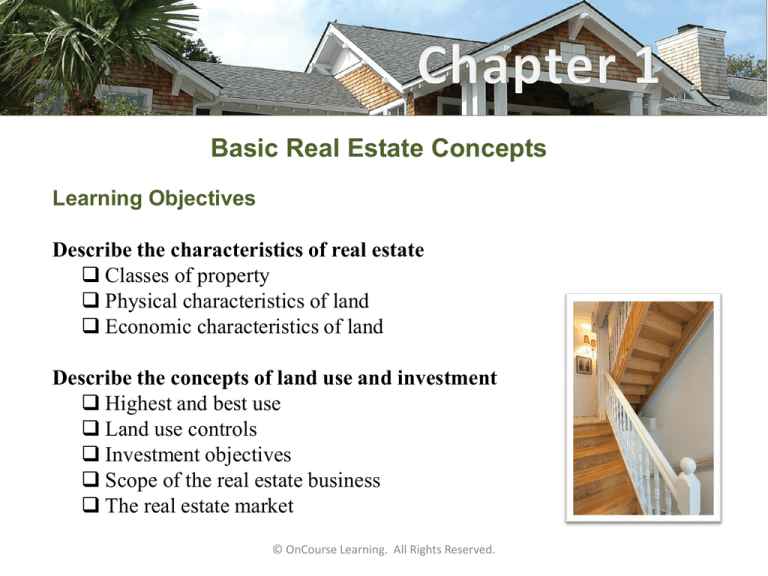
Basic Real Estate Concepts
Learning Objectives
Describe the characteristics of real estate
Classes of property
Physical characteristics of land
Economic characteristics of land
Describe the concepts of land use and investment
Highest and best use
Land use controls
Investment objectives
Scope of the real estate business
The real estate market
© OnCourse Learning. All Rights Reserved.
General Characteristics of Real Estate
Real Property
Real Property
Everything permanently attached to the land
The surface of the earth
Below the surface to the center of the earth and above the surface to the
highest heavens
All structures and improvements permanently attached
NOTE: “Real Estate”, “Real Property”, and “Realty” are interchangeable and
incorporate land, tenements, and hereditaments
© OnCourse Learning. All Rights Reserved.
General Characteristics of Real Estate
Personal Property – Anything not real property
Vehicles and boats
Jewelry, paintings
Mined minerals or harvested crops/timber
NOTE: Some items can be either real or personal property depending upon the
circumstances. For example:
Which is real
property and which
is personal
property?
© OnCourse Learning. All Rights Reserved.
General Characteristics of Real Estate
Physical Characteristics of Land
Immobility – Economic value through location
Permanence – The physical permanence of land affects its long-term
value
Uniqueness (non-homogeneity) – Each property is unique and not
generally substitutable
© OnCourse Learning. All Rights Reserved.
General Characteristics of Real Estate
Economic Characteristics of Land
Scarcity – There is a limited available supply of land
and this supply will not increase
Permanence of investment – the fixity of an
investment in real estate in a given area makes it a
relatively long-term investment
Location, or situs – in real estate, location is
everything
© OnCourse Learning. All Rights Reserved.
General Concepts of Land Use and Investment
Highest and Best Use
Provides greatest potential net return on investment
Under-improvement or over-improvement diminishes highest & best use
There is only one highest & best use at any given time for any given
property
The highest & best use a specific property changes over time
Other considerations:
• Land use controls
• External factors such as financing, market trends, etc.
• Conformity to surrounding properties and local tastes
© OnCourse Learning. All Rights Reserved.
General Concepts of Land Use and Investment
Public and Private Land Use Restrictions
Public land use controls
• City planning & zoning
• State & regional planning
• Building codes
• Occupancy requirements
• Environmental requirements
Private land use controls
• Restrictive covenants
• Easements and other restrictions
© OnCourse Learning. All Rights Reserved.
General Concepts of Land Use and Investment
Real Estate Investment Objectives
Personal use
Long-term appreciation
Tax shelter
Investment leverage
Positive cash flow
The emphasis for today's investor is usually either personal use or positive
cash flow with appreciation. Historically, real estate investments were
primarily used as tax shelters.
© OnCourse Learning. All Rights Reserved.
Scope of the Real Estate Business
The REALTOR® - National Association of REALTOR® (NAR)
REALTOR® is a registered trademark of the National Association of
REALTORS® (NAR)
NAR is a private trade organization that fosters ethical behavior of it’s
members
Not all licensees are REALTORS® – only active members of NAR may
use the term REALTOR®
NAR’s contributions to the real estate profession include:
• Code of Ethics
• Professional Stature
• Licensing Law efforts
• Federal Legislation
© OnCourse Learning. All Rights Reserved.
Scope of the Real Estate Business
The Real Estate Market
Free Market Pricing
Buyers and sellers are free to negotiate and establish
a price acceptable to both without undue pressure,
urgency, or outside influence other than the principle
of supply and demand.
Special Characteristics
The physical characteristic of immobility results in a
market that is slow to reach to changes in supply and
demand.
© OnCourse Learning. All Rights Reserved.
Scope of the Real Estate Business
The Real Estate Market
Supply and Demand
The supply and demand for real estate at any one point will determine the
price for a particular piece of real property. This assumes that all buyers
& sellers are rational and adequately informed.
Historical Trends
Just as the economy is subject to peaks and valleys the real estate
industry is also subject to recurring periods of recession and prosperity
© OnCourse Learning. All Rights Reserved.
Scope of the Real Estate Business
The Real Estate Practitioner
Provisional Broker – category of license that indicates person has not
completed the post-licensing requirements and has restricted work
VS.
Broker – category of license that indicates person has either completed
post-licensing requirements or received license prior to April 1, 2006
VS.
Broker-in-Charge (BIC) – has completed the educational and experience
requirement necessary to supervise real estate agents
© OnCourse Learning. All Rights Reserved.
Scope of the Real Estate Business
The Real Estate Practitioner
Important Note:
Broker or Agent is used interchangeably in the text when NO differentiation
is needed
Broker and Provisional Broker are used to distinguish two categories of
license.
© OnCourse Learning. All Rights Reserved.
Scope of the Real Estate Business
The Real Estate Practitioner…should have a through knowledge
Examples:
Property Ownership and Interests
Valuation
Land Use Controls
Fair Housing
Real Estate Terms
Forms
© OnCourse Learning. All Rights Reserved.








